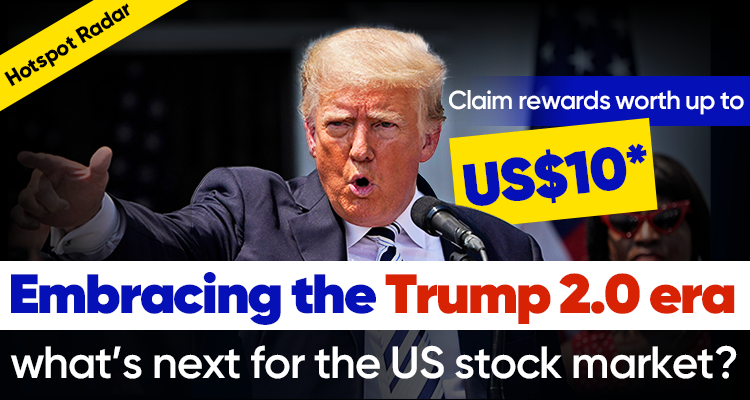
On January 20, President-elect Donald Trump will officially assume office as the 47th President of the United States. This marks the continuation of his political career and introduces new uncertainties and expectations for global financial markets.
The Trump 2.0 era
In his victory speech, Trump declared that he would usher in a "golden era for America." Known for his strong and pragmatic leadership, his policies often carry a strong "America First" ethos.
During his first term (2017–2021), Trump significantly boosted the US stock market with tax cuts, deregulation, and economic growth initiatives. However, his protectionist trade policies and diplomatic strategies also triggered market fluctuations.
As he returns to the White House, how Trump balances domestic policy and international relations will be a pivotal factor influencing US stock market trends.
Key milestones: how can the market prepare?
History shows that policy timelines often serve as triggers for market volatility. Understanding the timing of Trump’s policy rollout can help investors better manage risks.
November 2024: Trump wins the election. The Republican Party gains control of both chambers of Congress, boosting expectations for decisive policy implementation.
January 20, 2025: Official inauguration. New cabinet appointments lead to heightened market volatility, with investors watching closely for policy signals.
Late January 2025: Cabinet nominations.
Late January to early February 2025: Strategic planning begins, including the release of the National Security Strategy Report and submission of the FY2026 budget proposal.
Mid to late 2025: Implementation of the National Security Strategy, and Congressional approval of the FY2026 budget.
*Source: [Western Securities] Overseas Policy Special Report
Trump’s policy agenda: prioritising domestic interests
In his inaugural address, Donald Trump declared that "America's golden age is about to begin" and outlined his core policy priorities, which include:
Political System Reform:
Strengthening Executive Power and Reshaping Governance: Trump pledged to completely eliminate the "deep state's" constraints on executive authority, accusing the federal bureaucracy of being "corrupt and incompetent." He emphasized his commitment to driving "revolutionary governance reforms" during his new term.
Energy Policy:
Declaring a "National Energy Emergency": Mobilizing oil reserves to replenish national energy supplies and boost exports.
Ending the "Green New Deal": Repealing mandatory electric vehicle policies and easing restrictions on the energy sector.
Trade Policy:
Reforming the Trade System: Imposing tariffs on foreign goods, establishing a Foreign Tax Agency to levy duties, and emphasizing the reevaluation and adjustment of trade relationships.
Domestic Economic Policy:
Tax Cuts and Economic Stimulus: Extending or permanently implementing personal income tax cuts, reducing corporate tax rates from 21% to 15%, and significantly investing in infrastructure such as roads, bridges, and dams by reallocating unused funds from the Inflation Reduction Act and the Bipartisan Infrastructure Law.
Supporting Emerging Industries: Promoting the development of artificial intelligence by removing regulatory barriers in the AI sector and supporting cryptocurrency by lifting restrictions on its use and trading.
Additionally, Trump emphasized in his address that "revolutionary reforms" would be enacted to overturn the political legacy of the previous administration, restore U.S. sovereignty, and strengthen executive authority.
Tariff policies on China: escalation or moderation?
Trump may revive high tariffs on Chinese goods, potentially triggering a chain reaction in global markets:
China's exports remain stable, but the export structure is further shifting: China may continue to adhere to a strategy of diversifying its export markets, reducing reliance on specific markets to lower trade risks. Moving forward, it may further expand into other emerging markets, such as Africa and Latin America.
Rising US inflation: Higher prices for imported goods lead to increased consumer costs.
Trade deficit persists: Despite higher tariff revenues, narrowing the trade deficit remains challenging.
*Source: [Western Securities] Overseas Policy Special Report
Trading Special
*Please check the Reward Centre in the Tiger Trade app for details and requirements.
Investments come with risks. Market conditions can be unpredictable.
"Trump trades"
Trump Media & Technology Group (TMTG) was founded by Donald Trump with the primary aim of providing a platform for free speech, especially after his social media accounts were banned from mainstream platforms. TMTG's main product is Truth Social, a social network targeted toward a conservative audience and designed to bolster Trump's political influence. The company's development is closely tied to Trump's personal brand and political career, particularly during his 2024 presidential campaign.
Tesla CEO Elon Musk is a staunch supporter of President Donald Trump and has spent millions of dollars supporting his campaign. As an American electric vehicle manufacturer, Tesla benefited from increased support for domestic manufacturing during Trump's administration, which will help drive Tesla's expansion in the US market.
Financial Regulation
Traditional Energy & Oil:
Automobiles
Tech
Cryptocurrency:
*T&Cs apply. This is not financial advice. Investment involves risk. This advertisement has not been reviewed by the Monetary Authority of Singapore.